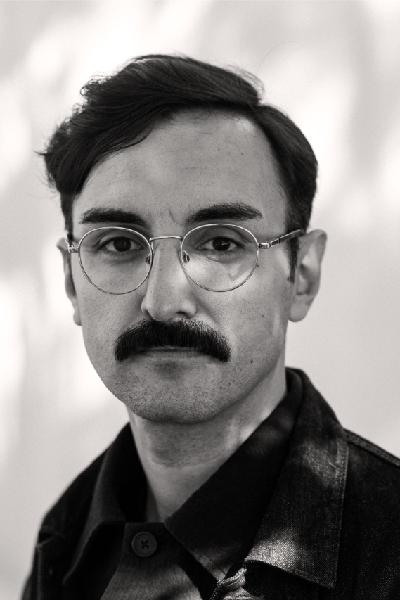Mahmoud Keshavarz
Biträdande universitetslektor vid Institutionen för kulturantropologi och etnologi; Kulturantropologi; Anställda
- E-post:
- mahmoud.keshavarz@antro.uu.se
- Besöksadress:
- Thunbergsvägen 3 H
- Postadress:
- Box 631
751 26 Uppsala
Docent vid Institutionen för kulturantropologi och etnologi; Kulturantropologi; Anställda
- Besöksadress:
- Thunbergsvägen 3 H
- Postadress:
- Box 631
751 26 Uppsala
- Akademiska meriter:
- Doc.
Mer information visas för dig som medarbetare om du loggar in.
Kort presentation
Denna text finns inte på svenska, därför visas den engelska versionen.
Mahmoud Keshavarz is Associate Professor (Docent) of Cultural Anthropology. His research is at the intersection of borders, migration, mobility and materiality, technology, design with a particualr focus on the question of race, colonialism, and coloniality. He has published on materialities and visualities of border violence, practices of smuggling and forgery, materiality of undocoumentedness, colonial imaginaries of design and technologies, politics of particiaption and knowledge production.
Nyckelord
- anthropological theory
- borders
- colonialism
- critical border studies
- decoloniality
- design anthropology
- design studies
- materiality
- migration
- mobility
- multimodal ethnography
- science and technology studies
- visual culture
Biografi
Denna text finns inte på svenska, därför visas den engelska versionen.
I am Associate Professor of Cultural Anthropology (2020, Uppsala University). I hold a PhD in Interaction Design (2016, Malmö University) with a thesis specialization in design studies and ethnography which won the award for best dissertation at Malmö University for the academic year of 2016–2017.
Between 2011 and 2023, I held teaching and research positions at Malmö University, Linnaeus University, Uppsala University, Stockholm University and University of Gothenburg both in design studies and anthropology. In 2014, I was a visiting scholar at The New School University in New York. Between 2017 and 2020 I was a postdoctoral researcher at the Engaging Vulnerability research program at Uppsala University.
From 2019 until 2023, I was co-editor-in-chief of the internationally peer-reviewed journal Design and Culture. I was a member of Artistic Research Review Panel at the Swedish Research Council (VR) between 2022-2023. I am also co-founder of Decolonizing Design collective and Critical Border Studies network.
Forskning
Denna text finns inte på svenska, därför visas den engelska versionen.
Since 2011, I have been engaged in a transdisciplinary research practice situated at the intersection of anthropology, design studies, and critical border studies with a particular focus on the question of (de-)coloniality.
My work focuses on the material politics of borders and the material struggles of bordered people in Europe. It investigates how borders are shaped by the materials, images, designs, and technologies that have emerged through colonialism and continue to be present in our everyday lives. As such my work combines a wide range of academic discourses such as the material turn, politics of aesthetics, design and visual culture, and postcolonial and decolonial thinking with ethnographic and historiographic methods and cultural analysis. I have done ethnographic fieldworks on objects, visualities and materialities of border violence and illegalized migration, practices of people smuggling, passport forgery, and border transgression, and colonial imaginaries of humanitarian design and innovation in Europe.
Border Situations: Essays on Designing, Politics, Anthropologies
Currently I am working on my second monograph. A series of structured, short, and polemical essays thinking across the anthropologies and politics of borders, this book discusses border materialities as designed situations and situations of designing to imagine possibilities of a world without borders.
The Missing Traveller: Absent Presences at the Border (2024- )
My current research project focuses on those who go missing in their attempt to enter Europe by transgressing European borders. Based on the fieldwork among relatives, activists, forensic experts and humanitarian organizations, this project examines how the presence of these missing persons are constructed by different actors and practices. In doing so, it explores the social, technological, material, visual, and political practices that shape particular kinds of presence of individuals in the social world due to their absence caused by borders.
Placed: The Colonial Imaginaries of Humanitarian Good(s) (2020-2023, Financed by Formas)
In this project I examined the material politics and imaginaries of humanitarian design in relation to borders and othering of refugees. Based on ethnographic fieldwork among a group of designers based in Sweden, I looked at how different design and technological interventions and solutions emerge from certain imaginaries and give shape to new imaginations about the future of what it means to be human.
Smuggling as a Material Critique of Borders (2017-2020)
My second research project and during my postdoc fellowship was an ethnographic inquiry into smugglers’ knowledge of borders as a form of what I call a material critique of borders. I focused on specific material and technical forms of knowledge that emerge in the space of (in)formality around borders.
Design-Politics (2011-2016)
My doctoral dissertation, Design-Politics: An Inquiry into Passports, Camps, and Borders (2016), based on ethnographic fieldwork among undocumented migrants and migrant smugglers in Europe and drawing on theories from critical border studies and design studies, shows how the politics of movement in general, and migration politics in particular, is articulated, performed, communicated, and contested through specific, historical material and design practices.

